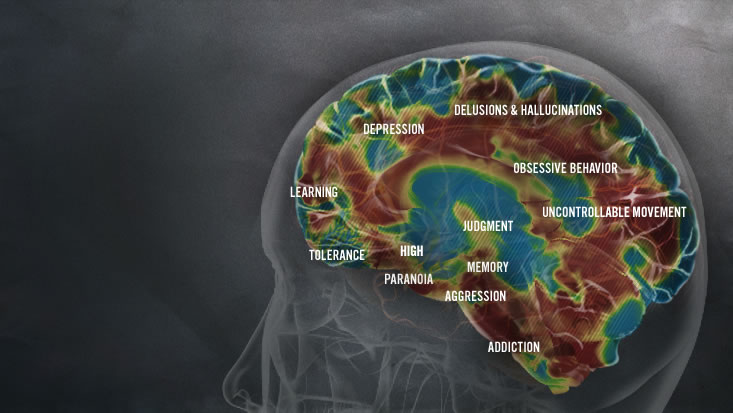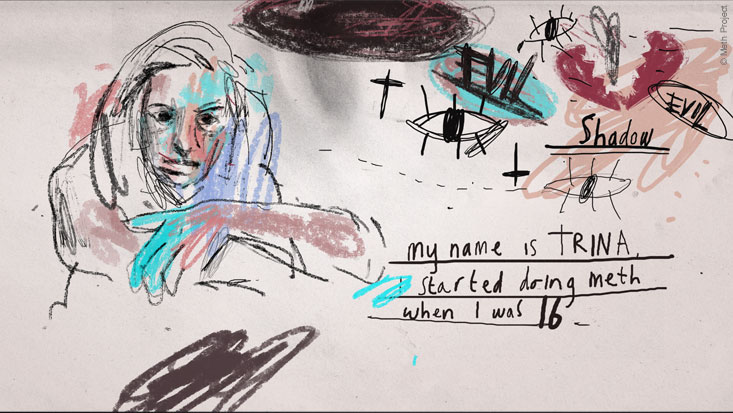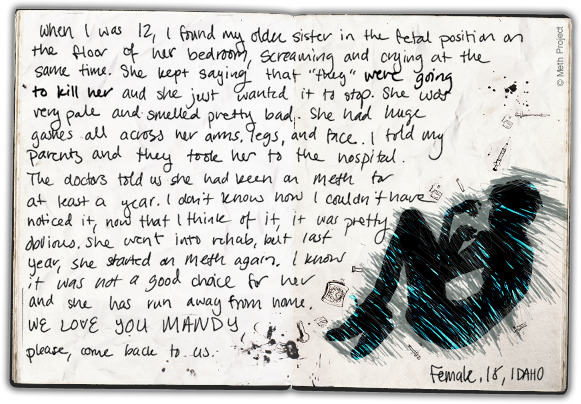
Brain Damage
Methamphetamine can cause significant
changes to the brain. Some are immediate
and some happen over time.
TapRollover the brain to see
Methamphetamine damages short- and long-term memory by changing the structure of the brain. Users talk about not being able to recall long stretches of time and struggle to remember things day to day.
Users often suffer from paranoia, a delusional disorder in which the person is irrational, hyper-alert, and has an overarching feeling of being in constant danger. Paranoia can set in within the first few months of use.
Meth impairs the frontal lobe, which governs judgment, impulse control, and the ability to determine consequences. Unable to think rationally, Meth users do things that they would have never thought possible before.
Meth floods the brain with dopamine, the neurotransmitter that produces pleasure. It first overstimulates the brain to create an intense rush, then causes an extreme, rebound low. Meth also initiates changes to the brain that severely impair the user's ability to experience pleasure.
Methamphetamine overstimulates the amygdala—the emotional control center of the brain—and compromises brain circuits needed to control impulsive behaviors. This inability to control behavior and an amped-up state filled with anxiety and paranoia make users prone to aggression and violence.
Meth hooks people faster than
almost any other illegal drug.
Using methamphetamine trains the brain to see Meth as the only way to feel good, no matter what problems it causes.
Meth use can cause involuntary facial and body movements-including twitching and repetitive ticks; writhing, jerky, and flailing movements; tremors and convulsions.
Meth users can become obsessed
with one thing for hours or
perform repetitive tasks over and
over because Meth disrupts the
brain’s inhibitory control—the
brain’s brakes—so users
can’t stop.
Meth can make people hear voices,
see things that aren’t really there
or even believe they feel things
like bugs crawling under their skin.
Users also often suffer from
persecutory delusions—believing
people are out to get them or that
they’re under surveillance.
Users experience a crippling
withdrawal marked by anxiety and
depression. Methamphetamine
damages systems in the brain that
regulate emotions and the ability
to experience pleasure. Their
bodies and minds are exhausted.
Confusion, cognitive impairment,
and thoughts of suicide are
also common.
The brain quickly builds up a tolerance to methamphetamine, setting up the cycle of dependence where users need the drug in order to feel pleasure, or simply to overcome the "crash." Over time, Meth causes anhedonia, the inability to experience pleasure.
Methamphetamine can cause long-lasting cognitive impairment, compromising the user's ability to learn and perform basic verbal tasks, as well as affecting basic motor skills.


Terms
-
The inability to feel pleasure. Methamphetamine can cause this by profoundly disrupting the brain’s reward system. Meth users may be left severely depressed and withdrawn. Crystal's Crash
-
The chemical in the brain that allows us to feel pleasure. It is also involved in movement, learning and memory, and motivation. Initially, methamphetamine floods the brain with dopamine. With repeated use, Meth severely depletes the brain’s dopamine supply. This makes it difficult for users to feel pleasure at all, lessens their ability to think and remember, and can also affect movement. How It Works
-
Brain damage caused by natural or artificial toxic substances called neurotoxins. Methamphetamine can be a neurotoxin, since it can damage nerve terminals and eventually kill neurons—the cells that send and receive signals in the brain and nervous system. Effects can include memory problems, psychosis, and sexual dysfunction. Mind Games
-
Purposeless movements resulting from mental tension and anxiety. Examples include uncontrollable fidgeting, abruptly starting and stopping tasks, and moving items around for no reason. These movements are common to obsessive-compulsive disorder and the use of stimulants like methamphetamine. "Looks Horrible"












